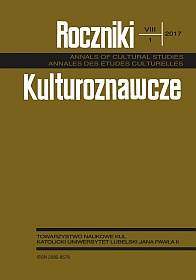Dialogical Character of Relationship between Man and Man in National Culture and European Multiculturalism
Abstract
The question of the attitude of national culture to multiculturalism is becoming a major problem today. A serious mistake is made when setting the alternatives being between the nation-state and multiculturalism. Polish History teaches us that at the base of the national culture are universal values that are important to all cultures and multicultural states. National culture is based on tradition, language and religion, which are characterized not only by—dialogically— dialogue on a historical level (references to a common past), but also by social level (references to the present). The background of any national culture is the human being, who experiences himself in dialogue with other people, and also in dialogue with other cultures and nations. The author of this article tries to bring the problem of man in from the perspective of people, nations, patriotism and society reflected by Rev. Józef Tischner and his interpretation of the words of Pope John Paul II at the United Nations in 1995. These two authors present the universal nature of the dialogue that lies at the base of the national culture, and the multicultural European. This dialogue is the result of the shared ethical values that underpin European culture concentrated on man and his dignity.
References
Böckenförde, Ernst-Wolfgang. Wolność – państwo – Kościół. Tłum. Paweł Kaczorowski i Grzegorz Sowiński. Kraków: Wydawnictwo Znak, 1994.
Buber, Martin. Problem człowieka. Tłum. Jan Doktór. Warszawa: Wydawnictwo Spacja, 1993.
Człowiek w nauce współczesnej. Rozmowy w Castel Gandolfo. Red. Krzysztof Michalski. Kraków: Wydawnictwo Znak, 2006.
Hegel, Georg Wilhelm Friedrich. Fenomenologia ducha. Tłum. Światosław Florian Nowicki. Warszawa: Fundacja Aletheia, 2002.
Jan Paweł II. Homilie i przemówienia z pielgrzymek. Ameryka Północna i Południowa. Dzieła zebrane. Tom XII. Kraków: Wydawnictwo M, 2009.
Jan Paweł II. Encykliki Jana Pawła II. Laborem exercens. Kraków: Wydawnictwo Znak, 1996.
Kant, Immanuel. O wiecznym pokoju. Tłum. Feliks Przybylak. Wstęp i red. Karol Bal. Wrocław: Wydawnictwo Uniwersytetu Wrocławskiego, 1992.
Lévinas, Emmanuel. Całość i nieskończoność. Tłum. Małgorzata Kowalska. Warszawa: PWN, 1998.
Michalski, Krzysztof. „Heidegger i filozofia”. W: Filozofia współczesna. Kraków: Instytut Teologiczny Księży Misjonarzy, 1989.
Nora, Pierre. Les lieux de mémoire. 1. République. Paris: Gallimard, 1984
Norwid, Cyprian Kamil. „Głos niedawno do wychodźstwa polskiego przybyłego artysty”. W: Pisma wszystkie, red. Juliusz W. Gomulicki, t. 7, cz. II. Warszawa: PIW, 1971
Tischner, Józef. Etyka a historia. Wykłady. Kraków: Wydawnictwo Znak, 2008
Tischner, Józef. Etyka solidarności oraz Homo sovieticus. Kraków: Wydawnictwo Znak, 1992.
Tischner, Józef. Filozofia człowieka dla duszpasterzy i artystów. Kraków: Wydawnictwo Naukowe Papieskiej Akademii Teologicznej, 1992.
Tischner, Józef. Filozofia dramatu. Paryż: Editions du dialogue, 1990.
Tischner, Józef. Myślenie według wartości. Kraków: Wydawnictwo Znak, 1995.
Tischner, Józef. Polska jest Ojczyzną. Paryż: Editions du dialogue, 1985.
Tischner, Józef. Polski kształt dialogu. Paryż: Editions Spotkania, 1981.
Tischner, Józef. Polski młyn. Kraków: Instytut Wydawniczy Księży Misjonarzy „Nasza Przeszłość”, 1991.
Tischner, Józef. Przedmowa do Ernst-Wolfgang Böckenförde. Wolność – państwo – Kościół. Tłum. Paweł Kaczorowski i Grzegorz Sowiński. Kraków: Wydawnictwo Znak, 1994.
Tischner, Józef. Świat ludzkiej nadziei. Kraków: Wydawnictwo Znak, 1992.
Tischner, Józef. W krainie schorowanej wyobraźni. Kraków: Wydawnictwo Znak, 1997.
Trentowski, Bronisław F. „Czy można uczyć się filozofii narodowej od ludu i jakie cechy mieć powinna taż filozofia”. W: 700 lat myśli polskiej. Filozofia i myśl społeczna w latach 1831–1864, red. Andrzej Walicki, 272–280. Warszawa: PWN, 1977.
„Głoście Ewangelię w zjednoczonej Europie. Przesłanie Jana Pawła II z okazji 95. Katholikentagu odbywającego się w Ulm”. Dostęp 01.09.2016. http://www.opoka.org.pl/biblioteka/W/WP/jan_pawel_ii/przemowienia/cd1994_15011994.html.





